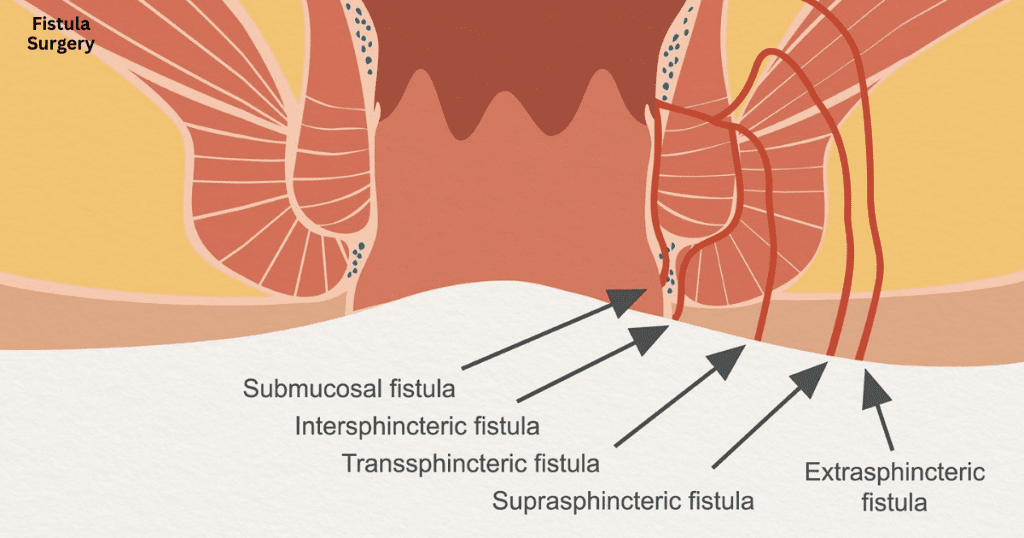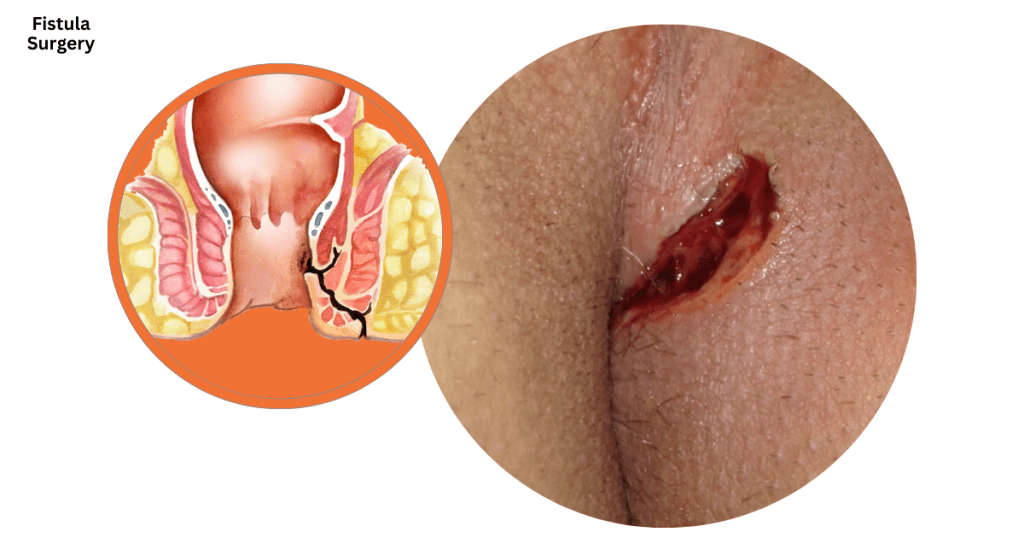Fistula surgery is an important surgery for many people who are in pain and complications that arise from fistulas. This one is a chronic condition, though it may result from infections or other chronic diseases, and must therefore be treated by a medical doctor. To get the right places for the residents of Vizag and Vijayawada, right treatment and properly understanding the process, it might be challenging. This blog seeks to act as a dedicated fistula surgery directory to make it easier for patients, those affected in these cities. It’s the best place for treatment for fistula surgery in vizag & Vijayawada at Surgikure.
Introduction:
A fistula can therefore be described as any unwanted union between any two structures in the body such as organs or blood vessels or the intestines. Fistulas are painful and if not treated can lead to other complications in the body. This normally does not respond to medications or even lifestyle changes, and the patient is normally advised to undergo surgery to have the problem fixed before it becomes worse and causes other complications. In this blog, we’ll learn what fistulas are, why one may need surgery and what happens before, during and after the surgery.


What is a Fistula?
Fistulas can occur in almost any area of the body but the three most frequent types are the fistulas in the area between the anus and the skin, the fistulas within the gastrointestinal tract, or the fistulas between the arteries and veins. They may be due to infections, operations, chronic inflammatory affections of the bowel, Crohn’s disease, types of cancer.
Effects of fistula vary depending on the place of fistula and its extent. For instance, anal fistulas may lead to pain, formation of a swelling as well as discharge around the anal region, enteric fistulas on the other hand may lead to severe diarrhea hence dehydration.
Why is it Necessary to Have Fistula Surgery?
Fistulas are known not to close spontaneously. If not treated, they can cause infection, formation of abscesses or sepsis, which is a severe systemic infection, normally treatable only by euthanasia. This is why surgery is the most effective way of treating the fistula and avoiding these effects.
Types of Fistula Surgery
There are several surgical options available depending on the type and location of the fistula:
- Fistulotomy: This is the most preferred technique of operating anal fistulas It is also known as fistelotomy. The surgeon then spares and dissects the fistula tract and then he allows it to heal from the inside. Essentially this procedure is uncomplicated and usually results in a high success ratio.
- Seton Placement: When performing a fistulotomy that might result in incontinence, a seton, which is just a thread, is placed through the fistula so that the wound remains open and is allowed to heal gradually. The seton can therefore be tightened in a stepwise manner in a bid to facilitate the healing of the fistula.
- Fibrin Glue: In some cases, an option is to sort of plug up the fistula with fibrin glue, which is injected through the fistula tract. This glue assists to close the fistula and hence heal in the whole process. Although it can be used in the surgical approach there are other methods that can also be utilized in the surgical procedure which may be more effective than this one.
- Flap Procedures: In a simple fistula this should not be necessary: in case of complicated or recurrent fistulas a flap of healthy tissue can be used to close the fistula opening from within.
- LIFT Procedure (Ligation of Intersphincteric Fistula Tract): In this procedure the fistula tract is divided and sutured and the wound is left open for prolonged several weeks or months after other wounds are taken over. It is most commonly applied when one or more fistulas are very deep.
- Endoscopic Ablation: This is relatively a less invasive investigation that employs an endoscope to visualize and seal the fistula tract.
Preparing for Fistula Surgery


Your doctor will most probably prescribe several preoperative procedures before proceeding with surgery. These may include:
- Medical Evaluation: A detailed inspection possibility of evaluating the fistulization level, the density of pus formation by means of MRI or CT.
- Bowel Preparation: Regarding fistulas in the gastrointestinal tract, a bowel preparation may be necessary before the endoscopic treatment.
- Antibiotics: In order to minimize the risk of infection your doctor may prescribe you antibiotics prior to the surgery.
What To Expect During Surgery:
Fistula surgery is done either under general or regional anaesthesia depending on the complexity and the site of the fistula. Depending on the complexity of the problem the procedure can last 30 minutes to a few hours. Majority of fistula surgeries do not require the patients to be hospitalized and they can be discharged as soon as the surgery is over.
Recovery and Aftercare:
To promote quick healing please make sure to heed to the doctor’s advice after the operation. Common postoperative care steps include:Common postoperative care steps include:
- Pain Management: Headache and discomfort are typical in the postoperative period, but you’ll receive medicine for that from your doctor.
- Wound Care: The maintenance of hygiene particularly at the Surgical site is very important to avoid infections. Your doctor will then prescribe on how the wound should be taken care of.
- Diet: This is especially important if you have a low fiber fistula and you may be advised to go on a low fiber diet for a few days after the surgery.
- Follow-Up: It is important to have follow up appointments so that the wound can be checked and any additional issues diagnosed.
Risks and Complications:
As with any surgery, fistula surgery carries some risks, including:As with any surgery, fistula surgery carries some risks, including:
- Infection: Infections can be found on the operation site although it is a very seldom thing in the modern world.
- Recurrence: It is also important to note that there are cases when fistulas can re-emerge on the patients after the surgery, the main reason being the lack of sufficient medicinal treatment of the diseases which are connected with them.
- Incontinence: Surgical procedures that are done close to the anal sphincter often leads to incontinence but this is rarely the case with experienced surgeons.
Conclusion:
Fistula surgery is a very important intervention when an individual has an abnormal communication between two structures and or organs which if left untreated can complicate the individuals health. Surgery as we all know is a very big process which anyone facing has to prepare him or herself for and here are some factors to help one prepare for surgery. best place to treat fistula surgery at surgikure in vizag and vijayawada. It is however important to seek advice from your medical doctor to identify the best way of handling your particular illness.
